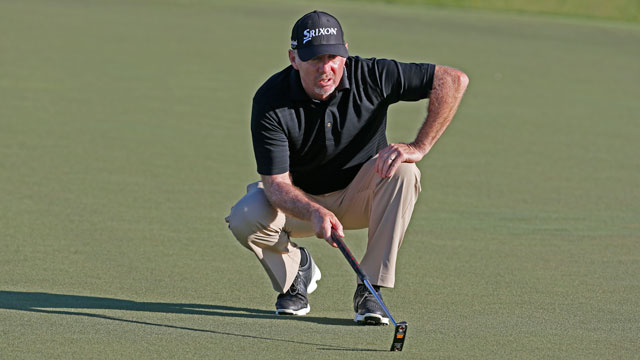NEWS
Blind date for Rod Pampling leads to wife, mother, psychologist

KAPALUA, Hawaii (AP) — Rod Pampling stood on the second tee at Kapalua, eyes forward and shoulders square.
So he passed the first test.
Posture was among the problems his clinical psychologist first noticed when he asked for her help. Now, as she stood some 50 feet away in the gallery, she provided a play-by-play of how his mind was working from when he pulled the club to when he hit the shot.
"Right now, he'll be discussing his shot so he can commit to the type of shot," she said as Pampling stood next to his caddie.
"Standing behind there, he's doing what he needs to either increase or decrease his arousal level, and visualizing the flight at the same time. And now," she said, lowering her voice to a whisper as Pampling settled in over the shot, "if he needed to have anything in there with his swing, he would do a drill.
"Another look at the target," she said just as Pampling turned his head toward the green. "Back down, eyes quiet."
The shot was on the way.
"And that says ... 'I don't like it.'"
Pampling let the club dangle over his shoulders as his tee shot into the par 3 rolled off the side of the green.
"It's all good," she said, striking a happy tone to go with her smile.
They have worked together for the better part of 17 years, and she is the most valuable part of his team — on and off the course. The clinical psychologist is Angela Pampling, his wife and the mother of their three children.
They met on a blind date in Ipswich, Australia, nearly 20 years ago. She was working with mental health patients at Royal Brisbane and Women's Hospital. Pampling had just returned from playing the mini-tours in America with limited success.
They kept their careers separate from their courtship, though it was inevitable that husband and wife would make time for doctor and patient.
It wasn't as simple as it might seem.
"She didn't want to, but I said, 'I need help,'" Pampling said.
Angela was dabbling in sports on the side, working with Olympic divers, which provided a good balance. At the hospital, she handled patients coping with debilitating issues, such as anxiety or depression. Sports brought her into a world of highly motivated, competitive, energetic athletes looking for an edge.
She was open to the idea of working with the man she was dating, but on one condition.
"He had worked with another psychologist and really had gone, 'Eh, it's mumbo-jumbo, I didn't get anything out of it,'" she said. "I said, 'That's fine. But don't ask me to work with you unless you respect what I do.'"
He agreed, even with the first assignment. She wanted him to write down each of his thoughts after every hole.
"It's unbelievable what I was thinking," Pampling said. "I had to do it after every hole. It was, 'What am I having for lunch?' and 'What was that noise?' She said that would need to change."
Then, without Pampling's knowledge, she took video of him through an entire round.
"She said, 'How did you feel?'" he recalled. "I said, 'Good, felt in control.' She said, 'Really? Let's watch some video.' I was a goofball out there, reacting to all these different things."
Angela laughs at the memory of their first few sessions, especially the unsuspecting video.
"Even though he was diligent, he lacked insight at times," she said. "His initial response was, 'Yes, but ... .' I said, 'OK, let's lose the 'but.' Let's look at what you're doing. The video was the hardest evidence. 'You look down when you walk, which impacts your posture, which makes you slump, which impacts your breathing, and also impacts the position of your swing.'"
They have been a team for all six of his worldwide victories, starting in 1999 when he beat Geoff Ogilvy at an Australasian Tour event, the most recent last year in Las Vegas when Pampling won for the first time in 10 years on the PGA Tour.
They moved to the Dallas area when Pampling started playing fulltime in America in 2000. Pampling reached as high as No. 22 in the world and now is trying to climb back into the top 100 at age 47. He at least has full status until he can join the PGA Tour Champions.
The lines are drawn when it comes to work and family.
"She is such a professional in what she does," Pampling said. "Her work is never at home. Even when we do some work together at home, we'll work for an hour and when we're done, the door closes and that side of it has left."
She is not at every tournament. There have been gaps in their working relationship brought on by life circumstances, such as the children and Angela spending three months in Australia when her father died in 2010.
The kids were asleep when Pampling returned home from winning in Las Vegas. He woke early the next morning to see them off, and to watch a replay that Angela had taped of his two-shot victory over Brooks Koepka.
Another video.
"I was double-checking to make sure it actually happened," Pampling said.
Now, work and family blend seamlessly. Pampling brought his entire family to Kapalua for the SBS Tournament of Champions, his first time eligible in 10 years. The family got a holiday in Hawaii out of it. The work never ends.
"She wakes up and says, 'Don't forget to do this, this and this,'" Pampling said. "And then she went back to bed."
This article was written by Doug Ferguson from The Associated Press and was legally licensed through the NewsCred publisher network.